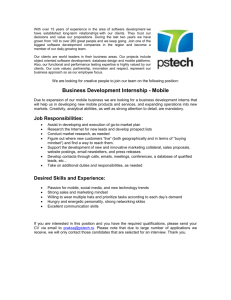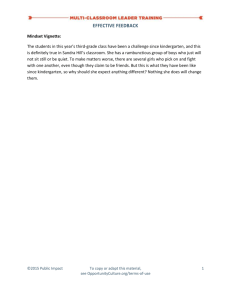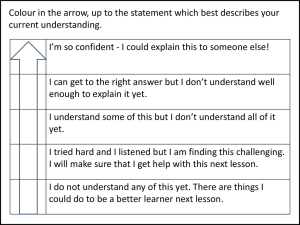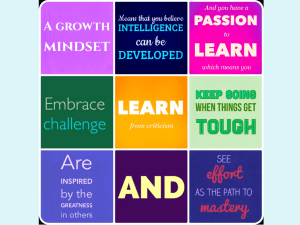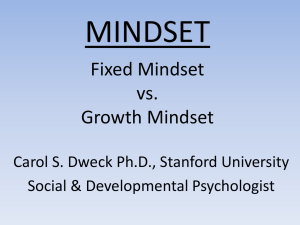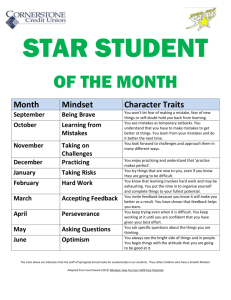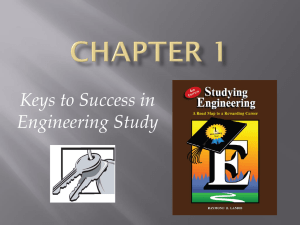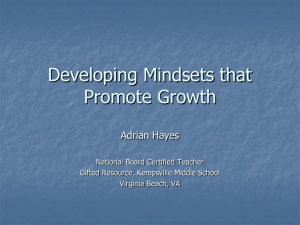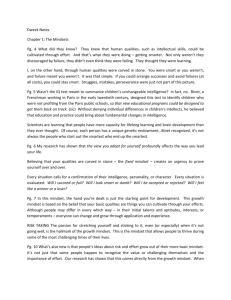Positive-Coaching
advertisement
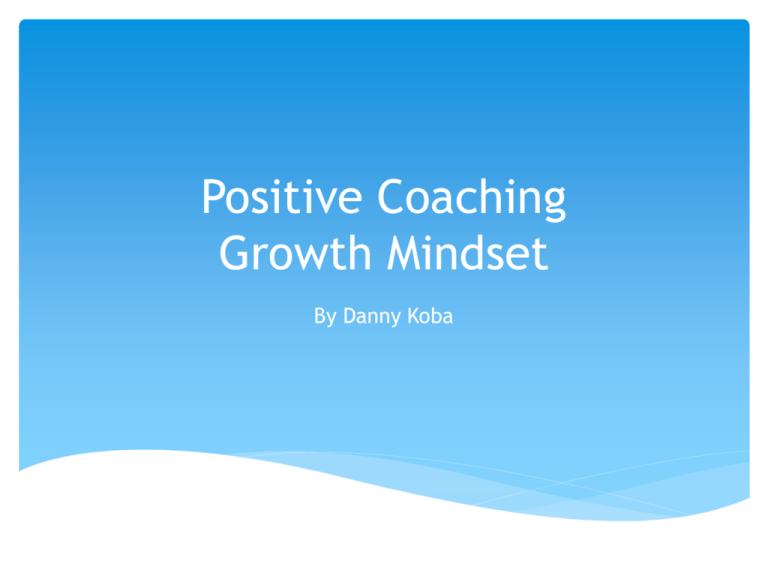
Positive Coaching Growth Mindset By Danny Koba Emerging Science New insights gained due to brain imaging techniques e.g., CT, MRI What was learned? Adolescence is a period of profound brain maturation. We thought brain development was complete by adolescence. We now know maturation is not complete until about age 25! Source: Giedd, 2004 Brain Development When pruning is complete, the brain is faster and more efficient. But, during the pruning process, the brain is not functioning fully. Maturation occurs from the back of the brain to the front. (prefrontal cortex) Source: Giedd, 2004 Pruning Process Dan Siegel, MD Neuropsychiatrist and Bestselling Author, explains how development in the brain during the adolescent years cause changes in a teen's mind and their behavior http://www.kidsinthehouse.com/teenager/health-anddevelopment/brain-development/pruning-process-adolescent-brain Developing Mindsets that Promote Growth What do we mean by “mindset”? Mindsets are the assumptions and expectations we have for ourselves and others. These attitudes guide our behavior and influence our responses to daily events. - Dr. Robert Brooks What does this mean? According to Stanford University psychologist Carol Dweck, success is not determined by innate talents and intellect. Rather, success depends upon mindset – the degree to which we believe we have the capacity to cultivate our intelligence and grow our abilities. (Click on image for video link.) When do you feel smart? Fixed mindset: “When I don’t make any mistakes.” “It’s when I finish first and it’s perfect.” “When something is easy for me and others can’t do it.” Growth mindset: “When it’s really hard, and I try hard, and I can do something I couldn’t before.” “When I work on something a long time and finally figure it out.” What’s the big deal? Fixed-mindset thinking results in: a false sense of superiority, undermined by a deep sense of self-doubt. a fear of failure; refusal to take risks. a feeling that failure permanently defines you as a loser. a need to prove yourself again and again. What’s the big deal? Fixed-mindset thinking results in: the belief that only untalented, ungifted people have to work for success; effort somehow reduces you. a need for validation and reassurance in labels (“smart,” “jock”) – whether earned or not. a desire to blame others or outside circumstances when things don’t go your way. The Fixed Mindset How does Calvin demonstrate the fixed mindset? Growth Mindset Growth-mindset thinking results in: a love for learning and self-improvement. a desire to be challenged. a willingness to work for positive results. a belief that you can control the outcomes in your life with effort and practice. the ability to learn from mistakes and failures. emotional resilience. The Power of Praise If we want our children to believe in their potential, how can we encourage them? How can we build their confidence and self-esteem? In one study, 80% of parents said it is necessary to praise a child’s ability in order to foster confidence. What is Self-Efficacy? Self-efficacy is the belief that you are capable of accomplishing the things you set out to do. A healthy self-esteem results when a child has a strong sense of self-efficacy. This comes from actual earned accomplishments, not piled-on praise. Self-Efficacy vs. Self-Esteem Students who demonstrate self-efficacy are more successful than students who have an inflated self-esteem (high confidence). What can I do? 10 Tips for Fostering the Growth Mindset 1. Practice what you preach. Model growth-mindset thinking with your child. Explain how you deal with challenges and how you continue to learn. Don’t label yourself in ways that demonstrate a fixed mindset: “I’m a terrible cook.” “I always had trouble in math too.” 2. Emphasize the joy of learning for learning’s sake. Talk about your student’s interests and how he or she is responding to the curriculum – not just, “How did you do on that test?” When discussing school, talk about learning as a means for personal reward, growth, intellectual challenge, and opportunity – not as a means to earn a grade or get into a great college. 3. Set appropriately high expectations and provide support. Lowering standards does not raise self-esteem. Expectations should focus on habits, effort, and growth, not grades. Provide students with needed supports (extra help, additional resources). Don’t assume that “you could do it easily if you just tried harder.” 4. Be mindful of the goals you set for your children and the messages they send. Work with your child to set goals that are reasonable and desirable for both of you. All goals should emphasize growth – the development of a skill or the expanding of knowledge. Having innate talent is not a goal your child can work toward. 5. Praise effort, practice, and process – not outcome. When your child succeeds, talk about the work that went into the success. Praise persistence and perseverance. Focus on the positive habits your child practiced and the choices she made which led up to the success. 6. Use failures as an opportunity for reflection and growth. Don’t use labels, and don’t let your child use them. Don’t shelter your child from the realities of failure by placing blame on others. Ask: “What can you learn from this experience? What could you try differently the next time?” 7. Provide honest, constructive criticism that emphasizes growth. Don’t harp on your child’s shortcomings or past mistakes. Work with your child to identify strategies for improvement. Involve your child in the problem-solving process, rather than meting out punishments. 8. Make concrete plans for growth. If your child identifies an area of weakness or is struggling, help your child establish a concrete plan for improvement. Avoid vague solutions: Ineffective: “I’ll study more.” Better: “I’ll review my class notes nightly and make flash cards for the difficult concepts.” Follow up with your child, and help him evaluate the process and refine the solution if necessary. SMART GOALS Specific Measurable Action Orientated Realistic Time bound 9. Point out the perseverance/ effort of favorite athletes and stars. Discuss what habits (focus, goal-setting, daily practice, commitment) enabled the athlete to be so successful. Avoid referring to a star athlete’s “natural” talent or “effortless” ability. Talk about famous people who failed in their early efforts. (Click on image for video link.) Mindset Video Other Tips and Tricks Meeting Environment How groups are formed Balance of fun and work at meetings Build a time for them to recognize each other Mentor them as they build SMART GOALS Check on their SMART Goals Share their successes Questions? “There isn’t a person anywhere who isn’t capable of doing more than he thinks he can.” – Henry Ford
